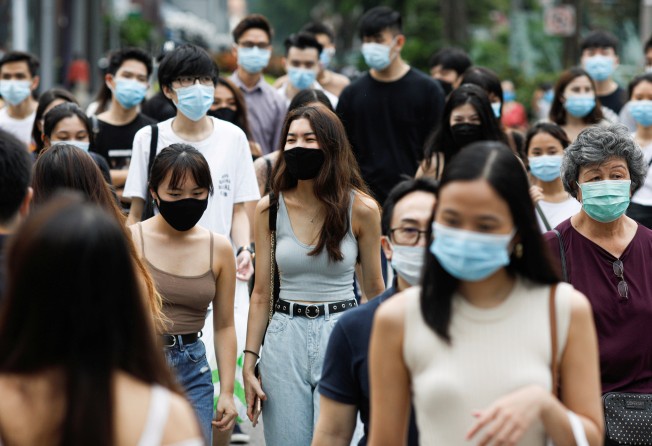Singapore population falls for first time in 17 years as firms hire fewer foreigners
- The city state’s total population dropped 0.3 per cent to 5.69 million as of June from a year ago, as the services sector saw fewer foreigners employed
- Foreign workers were a key issue in the July election, with several opposition candidates saying that locals were losing out on jobs

Singapore’s total population has fallen for the first time in 17 years, as the economic fallout from the coronavirus pandemic saw less foreigners working in the city state.
The overall population dropped by about 18,000 people, or 0.3 per cent, to 5.69 million, largely due to a reduction in foreign employment in the services sector, according to Singapore’s annual population report released on Thursday.
Total population, which include citizens, permanent residents, foreign workers and students, last fell in 2003 to 4.11 million from 4.18 million the year before.
The non-resident population was 1.64 million as of June 2020, a decrease of 2.1 per cent from June 2019 and the lowest since 2015. By visa type, work permit holders saw the largest decrease.
“These trends were largely due to Covid-19 related challenges, brought about by weak demand and travel restrictions,” according to the report.
Singapore’s non-resident population has more than doubled over the last 20 years, powering population growth in a city state with one of the world’s lowest birth rates.
Foreign workers became a key election issue in July, with several opposition candidates campaigning that jobs are getting taken away from locals.
The government has in recent weeks taken more steps to promote the hiring of Singaporeans and has tightened its framework for issuing employment passes for foreigners.
It plans to disburse S$1 billion (US$733 million) to encourage companies to “bring forward their hiring plans”, the manpower ministry said in a statement in early September. The jobs must pay a gross monthly wage of at least S$1,400 (US$1,025), and a company’s incentive will be reduced if existing employees leave, it said.
Eligible companies under the Jobs Growth Incentive programme will receive wage support of as much as S$15,000 for each local hire under 40 years old and S$30,000 for older workers. The government will pay 25 per cent of the first S$5,000 of monthly salaries for those under 40 for a year, and 50 per cent for those over that age, it said.
But authorities in the low-tax corporate hub, home to the Asian headquarters of many multinational companies, have also warned that a populist turn could hurt business.
“We must be careful not to give the wrong impression that we are now closing up and no longer welcoming foreigners,” Prime Minister Lee Hsien Loong said in a speech earlier this month.
Separately, Singapore’s proportion of citizens who are at least 65 years old has increased to 16.8 per cent from 10.1 per cent in 2010. The government is projecting this group will account for nearly a quarter of the citizen population in 2030.
Additional reporting by Reuters